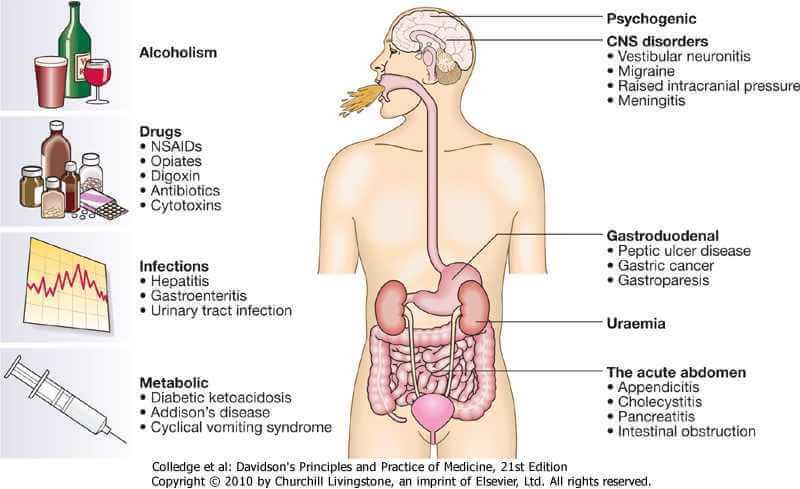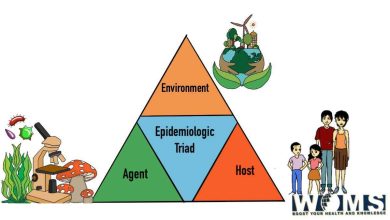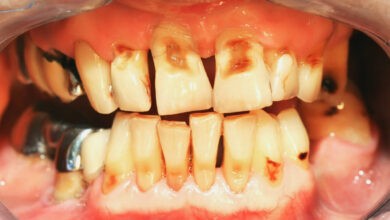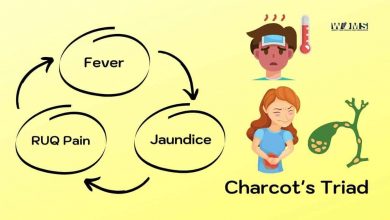Nausea & Vomiting Causes

What are the causes of Nausea and vomiting?
vomiting is the expulsion of gastric content via the mouth. It is a highly integrated and complex reflex involving both autonomic and somatic neural pathways. vomiting causes are discussed in the principal article.
Nausea may be defined as pronounced stomach discomfort and the sensation of wanting to vomit. The timing of vomiting can indicate the vomiting causes. The causes of vomiting and nausea are quite similar.
There are many things that can bring up nausea and vomiting. When appearing shortly after a meal, it may be caused by food poisoning, Gastritis, an ulcer, or bulimia. Vomiting one to eight hours after a meal also indicates food poisoning.
It is different from regurgitation, although two terms are often used interchangeably. Regurgitation is the return of undigested food back up the esophagus to the mouth, without force and displeasure associated with vomiting. In severe cases when dehydration develops, intravenous fluid me required.
Mechanism of vomiting
- Synchronous contraction of the diaphragm, intercostal muscle, and abdominal muscles
- Increase intra-abdominal pressure and combined with the relaxation of the lower oesophagal sphincter
- Forcible ejection of gastric contents
Electrolyte imbalance after vomiting:
- Hyponatremia
- Hypokalemia
- Metabolic alkalosis
- Paradoxical aciduria
Fluid should be given: Normal saline.
9 Important vomiting causes
The causes of both nausea and vomiting are quite similar which can occur separately or they can occur together. The most common causes of nausea and vomiting are:
1. Gastrointestinal
- Peptic ulcer disease
- Gastric cancer
- Gastroparesis
- Gastric outlet obstructions(projectile Vomiting)
- Gastroenteritis
- Acute abdominal conditions: Appendicitis, cholecystitis, Pancreatitis, Intestinal obstructions.
There is an amazing article on how you can Cure Gastritis. Make sure you read that blog too!
2. Infections
- Hepatitis
- Urinary tract infections(UTI).
3. CNS Disorder
- Raised ICP
- Vestibular disturbance(eg.motion sickness), migraine, meningitis.
4. Metabolic
- Uraemia. Hypercalcemia, Diabetic ketoacidosis
5. Drugs
- NSAIDs(Nonsteriodal anti-inflamtory driugs)
- opiates
- digoxin
- antiboitics
- cytotoxins
6. Pyschogenic
- Bulmia Nervosa
7. Alcholism
Alcohol causes irritation of the stomach which leads to vomiting. There are many other factors that cause vomiting after a heavy drink. The formation of acetaldehyde also causes vomiting.
8. Myocardial Infraction
Nausea and vomiting are associated with myocardial infarction. it is due to the occlusion of the subtotal and total coronary artery and myocardial necrosis which decreases the cardiac function and myocardial dilatation.
9. Pregnancy

Vomiting in pregnancy is also called morning sickness. it is one of the surest signs of pregnancy, it is one of the physiological processes but hyperemesis could be due to some pathological condition too. These are all about the vomiting causes.
Summary
Vomiting is a complex reflex that involves both autonomic and somatic neural pathways. nausea is the urge to vomit.
Synchronous contraction of the diagram, intercostal muscles, and abdominal muscles raises intra-abdominal pressure and, combined with the relaxation of the lower oesophageal sphincter, in results in the forcible ejection of the gastric content.
The causes of nausea and vomiting are similar to each other which they can occur together or separately. It is important to distinguish true vomiting is acute or chronic (recurrent), as the underlying causes may differ. The major vomiting causes are enlisted above.
if you have extreme vomiting please do visit to the doctor because you may suffer from dehydration and electrolytes imbalance.
General FAQs
A patient has come to you with severe upper abdominal pain and vomiting.
What is an important differential diagnosis?
Important differential diagnoses:
Peptic ulcer disease.
Acute pancreatitis.
Acute cholecystitis.
What is an important differential diagnosis?
Important differential diagnoses:
Peptic ulcer disease.
Acute pancreatitis.
Acute cholecystitis.
Mention the bad prognostic features of acute pancreatitis.
Bad prognostic features of acute pancreatitis
Age>55years.
PO2<8kPa (60mmHg).
White blood cell count(WBC)>15*10^9/litre
Alcumin<32g/l
Serum calcium<2mmol/l (8mg/dl) (corrected)
Gulcose>10mmol/l (45mg/dl)
Urea>16mmol/l (45mg/dl) ) (after rehydration)
Alanine aminotransferase (ALT).200U/l
Lactate dehydrogenase(LDH),600U/l
Write down the systemic complications of acute pancreatitis.
systemic complications
systematic inflammatory response syndrome(SIRS)
Hypoxia
Hyperglycaemia
Hypocalcemia
Reduced serum albumin concentrations




